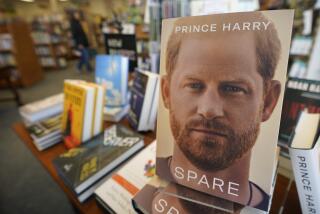Pip, Pip, Hooray! The Tyke Has Triumphed ... Again
- Share via
Few sights in cinema are more compelling than the small fry who stands up in the face of adversity or fear.
Think Pip in “Great Expectations,” Oliver in “Oliver Twist,” Dorothy in “The Wizard of Oz,” Huck Finn in “The Adventures of Huckleberry Finn” and, of course, Harry Potter.
With “Harry Potter and the Sorcerer’s Stone,” audience members of all sizes have the chance to delight in a favorite old yarn: the story of the tyke who triumphs, the little squirt who saves himself, saves the day and sometimes saves civilization.
J.K. Rowling’s bespectacled Harry Potter is the newest member of a rich literary and cinematic tradition of pint-size heroes that stretches to include the Grimm Brothers’ Hansel and Gretel, George Lucas’ Luke Skywalker and Wu Tianming’s Doggie in the unforgettable Chinese film “The King of Masks.”
These kids are survivors, tyros who get along in the world by dint of self-reliance, resourcefulness, luck and sometimes the intervention of magic. They are little people who stand tall when the sensible thing to do is run or cry. And they are models of behavior for millions of children (and grown-ups).
It is a convention of every tyro tale that the children are orphaned or abandoned by their parents. Hansel and Gretel are left to die in the woods at the insistence of their desperate, selfish mother. The infant Harry Potter is orphaned when both of his parents are killed in a mysterious explosion. He is consequently delivered to the Privet Drive home of his unwelcoming Aunt and Uncle Dursley.
We first meet Oliver Twist in a wretched London orphanage run by unsympathetic adults who feed their charges gruel and deny them second helpings. The orphan Pip, who knows his parents only by their tombstones, is brought up “by hand” by his older sister, the tickler-switching Mrs. Joe, and her long-suffering blacksmith husband. Dorothy is separated from her aunt and uncle, with whom she lives, when a tornado strikes.
Huck Finn’s only living parent is an abusive alcoholic father who locks his kid in a cabin when he goes off on binges. And Doggie, a little girl, is abandoned to an underground adoption market where she is sold to a street performer who, believing Doggie is a boy, takes her on as an apprentice.
The most remarkable and inspiring feature of all of these stories is evident from the earliest pages or frames of each one: The pint-size hero is nobody’s victim. He never feels sorry for himself or pities his circumstances. Nor does the tyke expect others to solve his problems or come to his aid. He views his circumstances with a kind of detachment and a buoyant faith in better times.
When Huck Finn, believing he is alone on an island, discovers the presence of a stranger, his alarm turns to resolution. “I didn’t sleep much,” Huck recalls. “I couldn’t, somehow, for thinking. And every time I waked up I thought somebody had me by the neck. So the sleep didn’t do me no good. By and by I says to myself, I can’t live this way; I’m a-going to find out who it is that’s here on the island with me; I’ll find out or bust. Well, I felt better right off.”
Indeed, more than any other character trait, these kids are defined by a never-cry, never-say-die kind of pluck, an optimism that might justify (and eventually reward) great expectations. Harry Potter sees his circumstances with absolute clarity, but his years as the neglected, under-loved charge of the Dursleys do not poison him or position him for a future as a guest on “Jerry Springer.” Indeed, Harry seems able to regard the Dursleys as a temporary inconvenience or a circumstance he is bound to rise above, just as he magically manages to do upon turning 11.
It is the job of the creators of these characters to throw every conceivable obstacle in the child’s path. Hansel and Gretel are locked in a cage. Harry is beset first by the narrow-minded Dursley lot and then by associates at Hogwarts School of Witchcraft and Wizardry. He soon learns he is fated, like his slightly older brethren--Luke Skywalker of “Star Wars” and Neo of “The Matrix”--to be the chosen one who will fight in the ultimate battle of Good against Evil. Doggie in “The King of Masks” comes up against the revelation of her gender, abandonment, fire, and the imprisonment of her adopted “grandfather.” Huck is threatened by earthly dangers including adults who would “sivilize” him and the father who would take his last penny.
The size of the obstacles are generally commensurate with the magnitude of the intervention or special assistance required. Where the future of a known world is threatened, as it is in “Harry Potter” and “Star Wars,” a special power as strong as the Force or good magic is a necessary part of the arsenal.
But even when otherworldly magic is applied, the message remains clear: The Force and the magic ultimately come from within. Harnessing the power of the Force or transfiguration or light-saber battling or casting spells comes from diligent study, apprenticeship and humility.
Such discipline can falter if the possessor of such powers does not have the proper courage or state of mind. Darth Vader and Potter’s Professor Quirrell and Voldemort all attempt to undo their nemeses by rattling them emotionally. Luke and Harry, who both desperately desire knowledge of their parents, must hold out against an emotional onslaught. Where Luke’s challenge is to distance himself from the man he learns is his father, Harry embraces his family and is rescued by the transcendent power of his mother’s love.
Where plain old earthly obstacles are in the way, it is not magic but possession of certain character traits that ensures success. Faced with the Dursleys’ ill treatment, Harry never succumbs to envy or spite. He remains generous, smart, good-hearted, self-reliant and self-sacrificing. So, too, do Pip, Oliver, Huck, Doggie and the others.
In the end, each classic tale of a pint-size hero reinforces the best behavior of human beings. Each, in its own way, provides a virtual how-to and an inspiration by rewarding behavior that is consistent with goodness--and even greatness.
These little heroes represent the best of what human beings--small and tall--can be.
*
Deborah Hornblow is a staff writer for the Hartford Courant, a Tribune company.
More to Read
Only good movies
Get the Indie Focus newsletter, Mark Olsen's weekly guide to the world of cinema.
You may occasionally receive promotional content from the Los Angeles Times.









